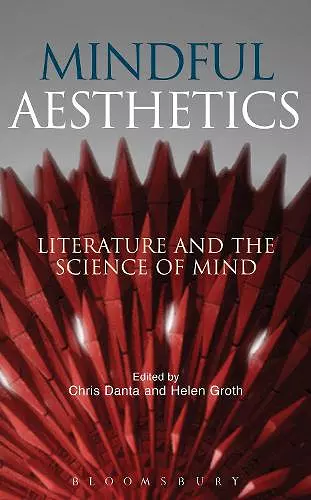Mindful Aesthetics
Literature and the Science of Mind
Dr Chris Danta editor Prof Helen Groth editor
Format:Hardback
Publisher:Bloomsbury Publishing PLC
Published:2nd Jan '14
Currently unavailable, and unfortunately no date known when it will be back

A timely intervention in one of the defining debates of contemporary literary studies—the relationship between scientific method and literary aesthetics.
In the last few decades, literary critics have increasingly drawn insights from cognitive neuroscience to deepen and clarify our understanding of literary representations of mind. This cognitive turn has been equally generative and contentious. While cognitive literary studies has reinforced how central the concept of mind is to aesthetic practice from the classical period to the present, critics have questioned its literalism and selective borrowing of scientific authority. Mindful Aesthetics presents both these perspectives as part of a broader consideration of the ongoing and vital importance of shifting concepts of mind to both literary and critical practice. This collection contributes to the forging of a ‘new interdisciplinarity,' to paraphrase Alan Richardson's recent preface to the Neural Sublime, that is more concerned with addressing how, rather than why, we should navigate the increasingly narrow gap between the humanities and the sciences.
[Danta and Groth’s] collection, Mindful Aesthetics, goes out of its way to include all manner of competing views. There is an essay by the polemical evolutionary critic Brian Boyd who dismisses both psychoanalysis and behaviorism. There is a vigorous defense of theory by Claire Colebrook (and another by Paul Sheehan). There is also a critique by Anthony Uhlmann of the centrality of metaphor to understandings of embodied cognition. … The collection is quite lively. * American Literature *
More than fifty years have elapsed since CP Snow delivered his famous lecture on ‘The Two Cultures’ in 1959, which identified an increasing gulf between scientific and literary disciplines. ... This collection of essays ... reflects on the impact of cognitive science on literature. ... The collection’s most successful historicizing essays are not framed as critiques of science from a humanities perspective, but transcend stark disciplinary divisions by drawing out mutual intersections. ... This emphasis on the openness and plasticity of cerebral functioning gestures towards the ways in which corporeal matter is permeated and shaped by theoretical abstractions. Contemporary Western society might be carved into neat opposing camps but biology exists in history: nature is entangled with culture whether we like it or not. * English *
The three groups of essays published in this volume provide an abundance of arguments legitimizing the use of literary research, thus placing it at the center of the entire field of cognitive literary studies. ... One of the great merits of this collection is the way in which it produces conversations around such differences of opinion, which results in the ability to read a number of the contributions dialogically. ... [It] avoids the temptation to find immediate solutions for the somewhat problematic position of literary studies within the sciences. Rather, it articulates nuanced questions concerning the nature of literary research and its relation to the scientific method. The absence of an overarching conclusion suggests that the editors wished to emphasize the diversity of perspectives expressed in their collection. This distinctive feature testifies to the scholarly quality of this volume. * Recherche littéraire/Literary Research *
[No] fewer than three important essay collections came out during the same period [2013], beginning with … Cognitive Literary Studies. … Two more specialized, but still wide-ranging, collections appeared later in the year: Mark Bruhn and Donald Wehrs's Cognition, Literature, and History, the first book of essays devoted to cognitive historicism, and Chris Danta and Helen Groth's Mindful Aesthetics, featuring an extended dialogue among cognitive researchers and critical observers of the field. Taken together, the lists of contributors to these three collections (which show surprisingly little overlap) demonstrate the broad appeal of cognitive literary studies, featuring scholars stationed not only in departments of English and American literature, but also in Spanish, French, German, theater, women's studies, comparative literature, media and film studies, and philosophy departments as well. * MFS Modern Fiction Studies *
Do recent advances in neuroscience better help us understand culture? Few questions have been more divisive for contemporary criticism and theory in the humanities. This timely collection of essays by critics on both sides of the debate helps us get to grips with the issue. Indeed I suspect that, from within its pages, a resolution begins to appear. What resolution? Read the book and find out. -- Simon During, Professor, Centre for the History of European Discourses, The University of Queensland, Australia
If one is determined to center one’s literary attention on the mind in the text, this volume is for you. And while committed in the main to cognitivist forms of literary criticism and theory, Mindful Aesthetics ranges over arguments both for and against this particular mode of literature and science scholarship. It makes a solid scholarly contribution to the ongoing debates. -- Bruce Clarke, Paul Whitfield Horn Professor of Literature and Science, Texas Tech University, USA
Featuring an exciting mix of established and emergent scholars in fields that include philosophy, literary theory, film studies, and the history of science, this wide-ranging collection raises key questions for research situated at the interface of aesthetics and the cognitive sciences. Indeed, even as it charts new directions for the study of literary (and other) art vis-à-vis human beings' mental dispositions and capacities, Mindful Aesthetics stands as a model for cross-disciplinary scholarship more generally. -- David Herman, Professor of Engaged Humanities, Department of English Studies, Durham University, UK
Mindful Aesthetics stages an informed and effective intervention into studies of literature, cognition, and evolutionary theory. In its energy, originality, and breadth of critical interests, this wide ranging collection speaks to the vitality and promise of the emerging field of cognitive literary and cultural criticism. -- Alan Richardson, Professor of English at Boston College, USA and author of The Neural Sublime
ISBN: 9781441102867
Dimensions: unknown
Weight: 503g
224 pages